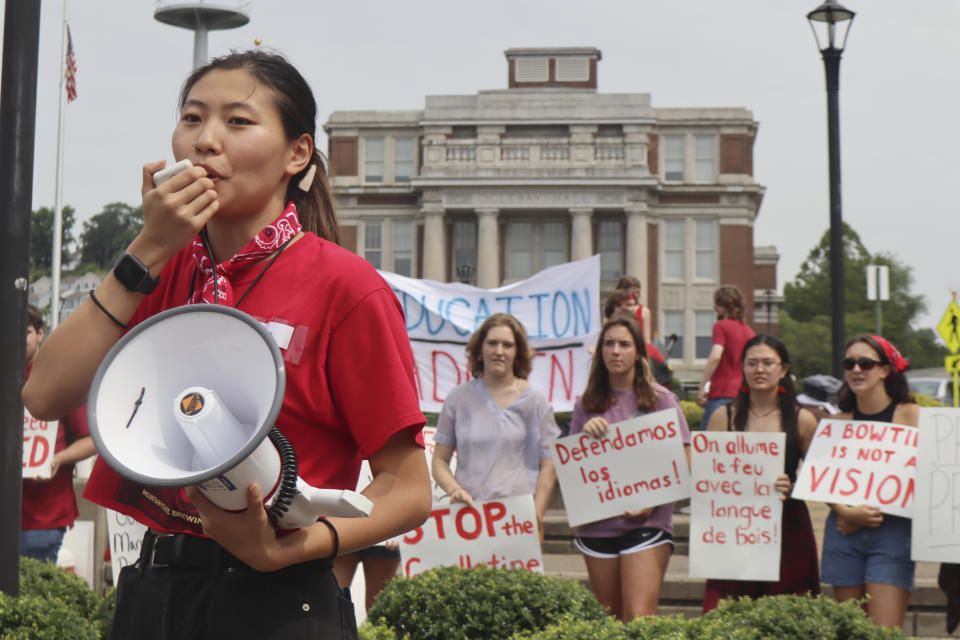CHARLESTON, W.Va. (AP) — Sophomore Christian Adams expected he would be studying Chinese when he enrolled at West Virginia University, with a dream of working in labor or immigration law.
He didn’t foresee switching his major to politics, a change he made after West Virginia’s flagship university in September cut its world language department and dozens of other programs in subjects such as English, math and music amid a $45 million budget shortfall.
And he certainly didn’t expect to be studying — or teaching fellow students — about community organizing.
But the cuts, denounced as “draconian and catastrophic" by the American Federation of Teachers, catalyzed a different kind of education: Adams is co-founder of The West Virginia United Students’ Union. The leading oppositional force against the cuts, the union organized protests, circulated petitions and helped save a handful of teaching positions before 143 faculty and 28 majors ultimately were cut.
Disappointed, they say their work is far from done. Led by many first-generation college students and those receiving financial aid in the state with the fewest college graduates, members say they want to usher in a new era of student involvement in university political life.
“Really, what it is for WVU is a new era of student politics,” Adams said.
The movement is part of a wave of student organizing at U.S. colleges and universities centering around everything from the affordability of higher education and representation to who has access to a diverse array of course offerings and workplace safety concerns.
The university in Morgantown had been weighed down financially by enrollment declines, revenue lost during the COVID-19 pandemic and an increasing debt load for new building projects. Other U.S. universities and colleges have faced similar decisions, but WVU's is among the most extreme examples of a flagship university turning to such dramatic cuts, particularly to foreign languages.
The union called the move to eliminate 8% of majors and 5% of faculty a failure of university leadership to uphold its mission as a land-grant institution, charged since the 1800s with educating rural students who historically had been excluded from higher education. A quarter of all children in West Virginia live in poverty, and many public K-12 schools don't offer robust language programs at a time when language knowledge is becoming increasingly important in the global jobs market.
As the school continues to evaluate its finances, the union plans to keep a close eye on its budget, mobilize against any additional proposed cuts and prepare alternative proposals to keep curriculum and faculty positions in place.
Another key goal is monitoring and influencing the school's search for its new president after university head E. Gordon Gee retires next year. Gee, the subject of symbolic motions from a faculty group that expressed no confidence in his leadership, said last year the curriculum cuts came at a time of change in higher education, and that WVU was “leading that change rather than being its victim.”
Higher education nationwide has become "arrogant" and “isolated,” he said, warning that without change, schools face “a very bleak future.”
Union Assembly of Delegates President and Co-Founder Matthew Kolb, a senior math major, said his group doesn't want a new president who believes running the school as a corporate or business entity is the only option for getting things done properly.
“We know, when push comes to shove, the results of that are 143 faculty getting shoved off a cliff with one vote," he said.
Adams, a north central West Virginia native who was the first in his family to attend college immediately after high school, said he could transfer to another institution and continue his studies in Chinese. But much of the reason he chose WVU was because of a commitment to the state and a desire to improve its socioeconomic outlook.
“A lot of West Virginians feel trapped in West Virginia and feel like they have to leave — not a lot of people choose to stay here," Adams said. “I made the conscious decision to go to WVU to stay here to help improve my state.”
The cuts meant reaffirming that commitment, “despite basically being told by my state's flagship university that, ‘Your major is irrelevant, it doesn’t matter, it’s not worth our time or money to teach.’”
Student union organizations have existed for hundreds of years worldwide. Commonly associated in the U.S. with on-campus hubs where students access dining halls, club offices and social events, in the United Kingdom the union also takes on the form of a university-independent advocacy arm lobbying at the institutional and national level.
Members say they envision the West Virginia United Students’ Union similar to those in the U.K., and it’s a concept they want to help grow.
That has meant a lot of work behind the scenes, strategizing to keep students interested and engaged and building relationships with the university campus workers union, student government and other organizations.
That work with the union helped keep up student morale as they watched faculty scramble to find new jobs and rewrite curriculum, student Felicia Carrara said.
An international studies and Russian studies double major from North Carolina, Carrara said she and many of her peers chose West Virginia University because it was affordable.
“The fact that we would now have to pivot to try and find the scholarships and other money to be able to afford an education anywhere else, or just not get a degree at all or get a degree that’s really bare bones. It’s just really disheartening," she said.
“When you come to higher ed, you think things are going to be better than they were in high school and in middle school,” she said. “And it’s very sad finding out that they’re not.”
Andrew Ross, a senior German and political science double major, will be the last graduate to major in the language.
A 31-year-old nontraditional student who transferred to WVU in 2022 after earning an associate's degree, Ross learned about the proposed cuts days after he returned home from a summer program in Germany he attended with the help of a departmental scholarship.
Ross, now the student union's assembly of delegates vice president, said the cuts “felt like getting slapped in the face.” The university told him to drop the German major. He's proud of his effort to finish the degree after twists and turns, but it's bittersweet.
“In some ways and it makes me sad because I hope there isn’t someone who is still growing up that can’t have this experience — we all deserve it,” he said. “This university isn’t just failing me, it’s failing the state.”


